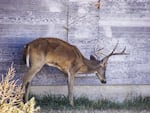
A deer with chronic wasting disease in an undated photo provided by the Kansas Department of Wildlife. The disease has been located in 31 states.
Photo courtesy of Mike Hopper, Kansas Department of Wildlife
Oregon wildlife officials are increasing the number of places where hunters can have deer and elk meat tested for a disease that could devastate big game herds if it makes its way to the state.
Chronic wasting disease was detected in northern Idaho in 2021, just 30 miles from the Oregon border. It has yet to be found in Oregon, though officials are concerned it could appear soon.
“There is no cure, no treatment, or vaccine for the disease, and it is fatal to all animals that become infected,” said Dr. Colin Gillin, state wildlife veterinarian, in a press release. “But if we catch it early, we will have the best chance of minimizing its spread and impact on Oregon’s big game herds.”
Hunters are required by law to stop at a check station if they pass one along a highway or interstate while transporting deer or elk, otherwise they risk getting a citation. The meat can also be tested at participating taxidermists and meat processing facilities. A list of check stations and participating businesses is located on the Oregon Department of Fish and Wildlife website.
It usually takes about 10 minutes for officials to test the meat at check stations. Samples are gathered from a collection of lymph nodes in an animal’s head.
Chronic wasting disease affects cervid animals, including deer, elk and moose. It’s spread through nose-to-nose contact, as well as through feces, blood and saliva. Infected animals can also shed the disease-causing proteins called prions in the soil for years, potentially infecting other animals.
Animals can carry the disease for years before showing symptoms, which include emaciation, drooling and loss of balance.
There’s currently no evidence that humans can contract the disease from eating or handling meat from an infected animal. Still, humans are susceptible to other diseases caused by similar prions, including mad cow disease and Creutzfeldt-Jakob disease. The Centers for Disease Control and Prevention offer a number of steps hunters can take to be safe.

